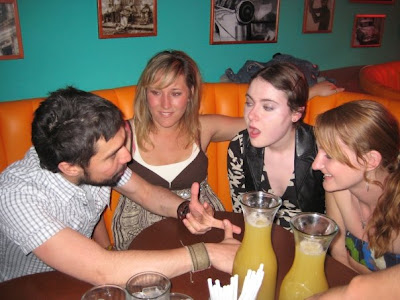As my friends browsed the nearby booths I was left to fend off his attack, which took the form of a friendly conversation:
"We should go out dancing sometime."
"Oh. Yeah... sorry i don't know how to dance."
"No worries! I could teach you. When do you want to go?"
"Oh, I don't know."
"Tonight? Tomorrow night? Sunday?"
"Oh, well, I have plans..."
"How do I get in touch with you then? Do you have a cell phone?"
"No... not in Mexico. How much did you say this pair of boots was again?"
Each excuse left him unfazed: like a boxing match, he hit me strike for strike. Of course, my own answers could have been much more direct: "No, thank you." "I have a boyfriend." "I'm not going to put out for you." But in a city where I have relatively few friends, I often don't realize the situation until I am knee deep. And even so, I find it hard to give flat out shut downs to someone who is obviously trying so hard.
Like the victim of any sexual harassment, I wonder: is it my fault? Yes, it was hot today. Yes, I was wearing a dress. (No, it wasn't that short.) Yes, I did straighten my hair and powder my face. My intention? A cute summer look. But suddenly I feel ashamed of how I've dressed. I regret the ruffled hemline and the shaved legs. I pull my hair back and hug my purse tighter to my chest. My desire to be noticed turns in to a desire to disappear.
Rationally speaking, of course, I don't take the matter entirely personally--the other girls also fended off their share of men, with my bustier pal even complying with a request for a hug from a disgruntled-looking middle-aged shopkeeper. The problem was not with us, but with them.
As a lecturer in one of my seminars pointed out, gender equality often means teaching women self-empowerment. You hold up a chart of what men can do, and you teach women to do the same thing. You give them boxing lessons and business positions. The end result should be something akin to a bunch of men, some of whom just happen to wear skirts.
But the problem, he pointed out, is not the women. In D.F. I have the liberty to walk around the city, from the afternoon tianguis to browsing the fabric district in the early night. I wear dresses when it's hot and shorts to run in the park. I take economics classes at UNAM. All of these things (perhaps minus the dresses) most men do as well, and so on paper it would appear as if I have achieved complete equality. The differences, I always thought, were a matter of class or race or some other factor, not gender.
But if I am equal in all of these ways, then why do I still have problems in public? It is not just the man in the store, but the countless men we walked by in our trek through the city. We heard whistles, salutations, sighs of content: our gender affected the way we were addressed and the way we were served.
The problem then, is not women but rather women's relationship with men. This problem not only manifests itself in countless catcalls but has gotten so bad that we are given our own cars on the metro and our own buses on the streets. On the few occasions where I have failed to take advantage of these options I have been groped, rubbed and generally abused.
While men lust after women in all parts of the world, there are different ways this lust is expressed, and different levels of which this expression is tolerated. I believe this is what our lecturer was getting at: it is the culture surrounding men's sexual expressions that needs to change, not the women themselves. Not only do these certain men (and I am by no means implying that all men are this way) see it fit to treat women in such a manner, but it seems that they go generally unpunished by society. Yes women are given their own areas in public transportation, but what are the protections for those who choose to ride in the general cars? Yes we have the freedom to do so, but at what cost?
Another thing that bothers me is the question of what makes me attractive to these men. When I walk down the street, the most usual comment I hear is not that I am pretty or sexy, but rather than I am white. Literally. It is not uncommon for Mexicans to address a lighter-skinned person as a güerra--a blonde or fair-skinned person-- or more commonly güerita (Mexicans also love to add "-ito/ita" onto everything). This pertains to all light-skinned people regardless of nationality, and is even considered as a polite greeting for my darker-skinned Mexican friends. But hearing "Hola güerita," twenty times in a day makes me start to wonder: am I considered attractive because I am white?
The comment also strikes me as considerably unpleasant, and I imagine similar greetings in the same style: "Hola blacky." "How ya doin' slant eyes?" But even more so than these slurs, the comment strikes me because it is meant in a positive light, as if I'm valued for my race. Are they really saying they'd like to make little white babies with me? Surely not, but I wonder if an American of a different race in a summer dress would get the same treatment. She might be spared the harassment, but would also be less valued in such a society.
At the end of a long day, riding in the women's car back to Coyoacán, I did see one thing that gave me hope. There, on the eve of Valentine's Day, were two young men, each with a dozen red flowers for their sweethearts.


good article, bad title.
ReplyDelete